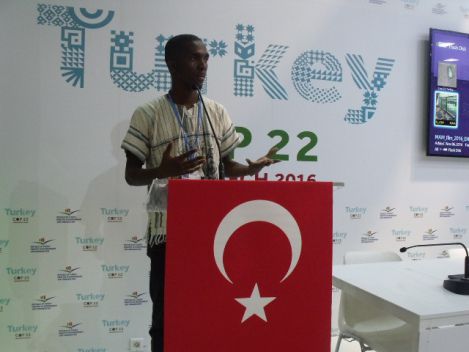“Water resource management is climate change adaption“ says Joe Bongay (Executive Director – Young Volunteers for the Environment – The Gambia) at the on-going UNFCCC Conference Of the Parties (COP) 22 Climate Conference, taking place in Marrakech, Morocco.
Blog post originally posted on 13 November 2016 on EcoView Africa online.

Joe presents to delegations at COP 22 in Morocco: November 2016.
Previously COP 21 highlighted the importance of oceans in the climate system through the mobilisation of over 150 parties and 40 ocean-related events. The high level Oceans Day at COP 21 brought together over 400 participants to highlight the central importance of oceans as an essential component of human well being, especially in the 183 coastal and island nations around the world.
The COP 22 is expected to turn the promise of Paris into action and translate the mobilisation into action, with an adaptation and mitigation agenda that includes innovative and ambitions measures, supported by matching financing mechanisms and capacity development packages.
The global ocean is fundamental to sustaining life on Earth, it is a major carbon sink, it absorbs heat and produces half the oxygen we breathe. The ocean is also a major avenue for achieving the UN Sustainable Development Goals through the development of the ‘Blue Economy’. Shipping, fisheries and aqua-culture, energy, biotechnology, and mineral and biological extraction already generate over $3-6 trillion (USD). However, climate change is having profound, diverse, and regionally disproportionate impact on ocean ecosystems and the services they provide. Considerable capacity development and financing are required to cohesively address the challenges of climate change, especially those on coastal and island populations.
One of the biggest challenges in the future is water resource management. Securing a sufficient amount of first class water and preventing both drought and flood calls for robust management. Water resource management based on reliable data gives an opportunity to act.
How much water is flowing in the stream? Will people and animals have enough water to drink? Is there water enough to irrigate the fields or produce electricity? Is flooding to be expected?
Timely and reliable answers to such questions are essential for water resource management. Many peoples’ livelihoods may depend on these answers.
These challenges become more ad more important as we experience actual climate changes – having higher temperatures, extreme weather, droughts and so on.
This calls for urgent action, but to act, we need knowledge – and data.
#COP22 #yvegambia #youthpower
By: Joe Bongay (JVE)